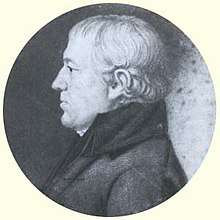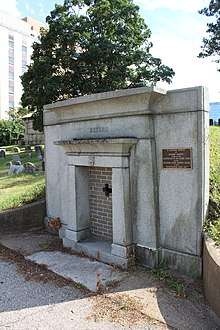Richard Bassett (Delaware politician)
Richard Bassett (April 2, 1745 – September 15, 1815) was a Delaware attorney and politician, veteran of the American Revolutionary War, delegate to the Constitutional Convention of 1787, signer of the United States Constitution, United States Senator from Delaware, Chief Justice of the Delaware Court of Common Pleas, Governor of Delaware and a United States Circuit Judge of the United States Circuit Court for the Third Circuit. He holds the overall seniority position of #1 in the history of the United States Senate.
Richard Bassett | |
|---|---|
 | |
| Judge of the United States Circuit Court for the Third Circuit | |
| In office February 20, 1801 – July 1, 1802 | |
| Appointed by | John Adams |
| Preceded by | Seat established by 2 Stat. 89 |
| Succeeded by | Seat abolished |
| Governor of Delaware | |
| In office January 9, 1799 – March 3, 1801 | |
| Preceded by | Daniel Rogers |
| Succeeded by | James Sykes |
| Chief Justice of the Delaware Court of Common Pleas | |
| In office March 4, 1793 – January 15, 1799 | |
| Preceded by | Office established |
| Succeeded by | James Booth |
| United States senator from Delaware | |
| In office March 4, 1789 – March 3, 1793 | |
| Preceded by | Office established |
| Succeeded by | John Vining |
| Personal details | |
| Born | Richard Bassett April 2, 1745 Cecil County, Province of Maryland, British America |
| Died | August 15, 1815 (aged 70) Cecil County, Maryland |
| Resting place | Wilmington and Brandywine Cemetery Wilmington, Delaware |
| Political party | Federalist |
| Relatives | Richard H. Bayard James A. Bayard Jr. |
| Education | read law |
Education and career

Born on April 2, 1745, in Cecil County, Province of Maryland, British America,[1] Bassett pursued preparatory studies, then read law.[1] He was admitted to the bar and practiced law in Delaware.[2] By concentrating on agricultural pursuits as well as religious and charitable concerns, he quickly established himself amongst the local gentry and "developed a reputation for hospitality and philanthropy."[3] He was a member of the Delaware constitutional conventions of 1776 and 1792.[2] He was a member of the Council of Safety in Dover, Delaware from 1776 to 1786.[1] He served in the Delaware State Militia as a company captain of the Dover Light Horse Regiment from 1777 to 1781.[1] He was a member of the Delaware Legislative Council (now the Delaware Senate) in 1782.[1] He was a member of the Delaware House of Representatives in 1786.[1] He was a delegate to the Constitutional Convention in 1787,[2] and was a signer of the United States Constitution.[2] He was a member of the Delaware convention which ratified the United States Constitution in 1787.[2] He was in private practice in Wilmington, Delaware from 1787 to 1789.[1]
Congressional service
Bassett was elected to the United States Senate from Delaware and served from March 4, 1789, to March 3, 1793, first as a member of the Anti-Administration Party and later as a member of the Pro-Administration Party.[2] He holds the overall seniority position of #1 in the history of the United States Senate.[4]
Later career
Bassett was Chief Justice of the Delaware Court of Common Pleas from 1793 to 1799.[1] He was Governor of Delaware from 1799 to 1801.[1]
Federal judicial service
Bassett was nominated by President John Adams on February 18, 1801, to the United States Circuit Court for the Third Circuit, to a new seat authorized by 2 Stat. 89.[1] He was confirmed by the United States Senate on February 20, 1801, and received his commission the same day.[1] His service terminated on July 1, 1802, due to abolition of the court.[1]
Later life and death


After leaving the federal bench, Bassett became a planter in Cecil County from 1802 to 1815.[1] He died on September 15, 1815, on his estate Bohemia Manor in Cecil County.[Note 1][2][1] He was initially interred in Cecil County, Maryland and in 1865 his remains were reinterred in Wilmington and Brandywine Cemetery in Wilmington, Delaware.[5]
Family
Bassett was the grandfather of Richard H. Bayard and James A. Bayard Jr., both United States Senators from Delaware.[2]
Note
- Some sources give his place of death as Kent County, Delaware.
References
- Richard Bassett at the Biographical Directory of Federal Judges, a public domain publication of the Federal Judicial Center.
- United States Congress. "Richard Bassett (id: B000226)". Biographical Directory of the United States Congress.
- Wright, Jr., Robert K.; MacGregor Jr., Morris J. (1987). "Richard Bassett". Soldier-Statesmen of the Constitution. Washington D.C.: United States Army Center of Military History. CMH Pub 71-25.
- "SENATORS OF THE UNITED STATES 1789-present A chronological list of senators since the First Congress in 1789" (PDF). United States Senate.
- "Richard Bassett". www.findagrave.com. Retrieved August 17, 2019.
- "Origins of Madison Street Names at the website for Wisconsin Historical Society".
Sources
- Conrad, Henry C. (1908). History of the State of Delaware. Lancaster, Pennsylvania: Wickersham Company.
- Hoffecker, Carol E. (2004). Democracy in Delaware. Wilmington, Delaware: Cedar Tree Books. ISBN 1-892142-23-6.
- Munroe, John A. (1954). Federalist Delaware 1775–1815. Rutgers University, New Brunswick.
- Martin, Roger A. (1984). History of Delaware Through its Governors. Wilmington, Delaware: McClafferty Press.
- Martin, Roger A. (1995). Memoirs of the Senate. Newark, Delaware: Roger A. Martin.
- Scharf, John Thomas (1888). History of Delaware 1609–1888. 2 vols. Philadelphia: L. J. Richards & Co. ISBN 0-87413-493-5.
Images
- National Portrait Gallery; portrait courtesy of the National Portrait Gallery.
External links
- Richard Bassett at the Biographical Directory of Federal Judges, a public domain publication of the Federal Judicial Center.
- Biographical Directory of the Governors of the United States
- United States Congress. "Richard Bassett (id: B000226)". Biographical Directory of the United States Congress.
- Biography by Russell Pickett
- Delaware’s Governors
- Richard Bassett at Find a Grave
- The Political Graveyard
- Judges of the United States Courts
- National Archives
- Biography of Bassett in Soldier-Statesman of the Constitution at the United States Army Center of Military History
| Party political offices | ||
|---|---|---|
| Preceded by Gunning Bedford Sr. |
Federalist nominee for Governor of Delaware 1798 |
Succeeded by Nathaniel Mitchell |
| U.S. Senate | ||
| Preceded by Seat established |
United States Senator (Class 2) from Delaware 1789–1793 |
Succeeded by John Vining |
| Political offices | ||
| Preceded by Daniel Rogers |
Governor of Delaware 1799–1801 |
Succeeded by James Sykes |
| Legal offices | ||
| Preceded by Seat established by 2 Stat. 89 |
Judge of the United States Circuit Court for the Third Circuit 1801–1802 |
Succeeded by Seat abolished |


